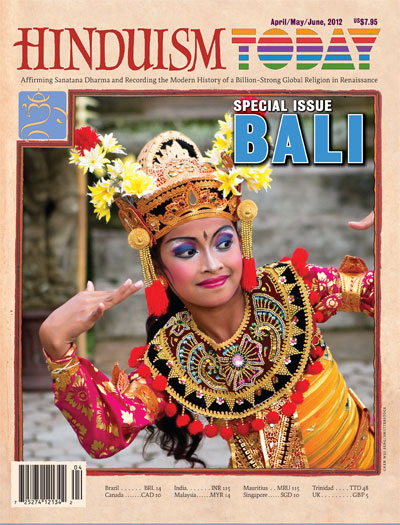New Hinduism Today Issue on Balinese Hindus

The latest issue of Hinduism Today for April/May/June 2012 may be ordered online at www.minimela.com in single copies and in multiple copies at discounted prices. This issue focuses on the Hinduism of Bali where we experience the people and explore the temples of this unique Hindu outpost.
Read about the history of Hindus settled in Bali and the Lontar palm-leaf manuscripts which reflect Bali’s connection with ancient India. An expatriate Australian married to a Balinese shares her keen cultural insights, and we tease you with a sampling of the arts, music, painting and dance which permeate Bali’s spirit and unique forms.
Dare we speak about Nyepi, the day of silence, when all of Bali comes to a complete stop. And how do Hindus inside and outside of Bali understand their tradition of animal sacrifice? Find out all about this controversial practice in this issue. Discover why Bali’s cremation rites reflect a cogent understanding of the soul’s passage, and we conclude our Balinese issue with Bali’s reflective response to the 2002 terror attacks which stunned the world.
Satguru Bodhinatha Veylanswami discusses how our soul matures slowly over time in this issue’s Publisher’s Desk, and Dada Vaswani gives a presentation on Atma Vidya, the science of the Self.
The Insight section features the traditional wedding with a pictorial summary for Hindus in the diaspora.
And, as usual, read our regular digests on Global Dharma, Quotes & Quips and Digital Dharma. With stunning photos and in-depth articles you don’t want to miss this special issue on Bali!
4 Responses to “New Hinduism Today Issue on Balinese Hindus”
From Our Gurus' Teachings
Archives are now available through 2001. Light colored days have no posts. 1998-2001 coming later.

February 28th, 2012 at 7:48 pm
//And how do Hindus inside and outside of Bali understand their tradition of animal sacrifice? //
May I be told what is controversial about this practice of offering sacrifice to the Gods? Sacrifice or Bali is a fairly common practice that was in vogue in most parts of India amongst Hindus till fairly recently.
Al thought the Indian govt. has placed severe restrictions on animal sacrifice (as far as Hindus are concerned), the practice still exists in many parts. Being scholars, you people should concentrate on issues that really concern Hindus globally and not attack our ancient practices which have very good reasons for their existence.
BTW, why don’t you do a series on the stupidity of Hindus of India who have no problems in killing the unborn, when this is one of the biggest sins and crimes as described by the dharmashastras or the fact that a large number of Hindu women are forsaking their natural duties of taking care of the home and hearth for ‘corporate” jobs. These are the issues that really concern Hindus and not the ones you’re mentioning.
March 1st, 2012 at 3:32 pm
@nmk
Animal sacrifice has NOT been COMMON in the general Hindu population for millenia. Even the likes of the horse sacrifice was only undertaken under severely restricted situations. Animal sacrifice has long been peripheral, shaktas in Bengal and Assam, Nepal, but not in the heartlands and certainly not amongst the dominant Vaishava traditions.
It might be news to you, but Hinduism absorbed alot of Buddhist and Jain content centuries ago.
It is controversial because the dominant Hindu stance is against such practices.
March 3rd, 2012 at 8:56 am
Thanks for the details on Today at Kauai’s Hindu Monastery, 2/26/2012: New Hinduism Today Issue on Balinese Hindus, it’ll be really useful.
March 4th, 2012 at 8:16 pm
@Sam
Please, don’t tell me all those revisionist stories of how Hindus didn’t kill animals for food. If its not dominant amongst vaisnavas, then so be it. Why should saivas and shaktas bear with it?
We are not forcing anyone to become meat eaters and we expect the same in return. As for the influences of Jainism and Buddhism, what does that even have to do with this topic? If Jaina and Bauddha influences have corrupted Hindu ethos then they need to removed and not followed blindly just because they happened to occur.
vaisnavism is a far recent recent addition to the Hindu schools of thought anyway, saivism followed by shakta tradition are the most ancient schools of thought and hence the premise on which you base your argument fails.
If you want to be a veggie fanatic then do so, but don’t tell me that my sastras make it incumbent on me to be one.
BTW, what’s your opinion on abortions? You like most other fanatical veggies don’t seem to have a problem on the critical issue of baby killing that I raised, or maybe the life of a goat is more important to you than that of a human hindu baby.